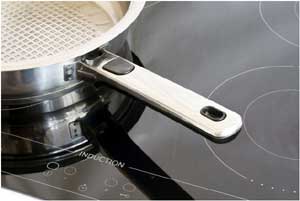
A new 3 year German research project ”InduKOCH “ makes Induction stoves are getting more affordable and more energy efficient. The research team consisted of E.G.O. Group, a worldwide supplier for manufacturers of household appliances, the University of Bremen’s Institute for Electrical Drives, Power Electronics and Devices (IALB) and semiconductor manufacturer Infineon Technologies, who headed the project.
The team succeeded in reducing the number of components that induction stoves require. The benefits for consumers: in the future a standard induction stove will not be much more expensive than a conventional stove. Moreover, there will be less power dissipation so that today’s already very energy-efficient induction methods will use even less electricity in the future. Induction heaters and stoves based on InduKOCH technology consume between 20 and 100 kilowatt-hours (kWh) less power per year than conventional electric stoves, making an active contribution to climate protection.
A sample calculation: Thanks to InduKOCH, the number of German households with induction stoves could double from more than 6 million today (about 17 percent of all households in Germany) to about 12 million (about 30 percent). Assuming that for an induction stove an average of about 60 kWh less electricity per year has to be produced compared to that for a conventional electric stove, the resulting CO2 reduction is considerable. In Germany, the amount of CO2 reduction per year would correspond to the emissions of 100,000 cars (at an average annual distance traveled of 13,000 km). This calculation is based on an estimate of the German Federal Environment Agency from 2012 that the generation of a kilowatt-hour of electricity releases about 600 g of CO2.
”German households could profit from energy-saving and more affordable induction stoves already in 2014. Thanks to InduKOCH, replacing a conventional electric stove is now a lot more worth it,” says Dr. Stephan Voss, developer at Infineon Technologies and project head of the research project InduKOCH. ”This transformation is a big contribution to the environment – because the greatest energy resource is the energy that is not used. 60 kWh of electric energy are saved annually per induction stove, resulting in less CO2 produced. If the number of induction stoves were to double in Germany, the amount of CO2 emissions would be reduced by an amount that corresponds to that of 100,000 cars.”
New chip research and new insides for induction stoves
To make induction stoves more efficient and more affordable, Infineon is researching how its chips – so-called IGBTs (Insulated Gate Bipolar Transistor) – can be further developed. The IGBTs regulate the high-frequency current of the induction coils, whose electromagnetic field generates heat in the pots for cooking. The new IGBTs will be up to 40 percent more efficient than their predecessors at the beginning of the project. The E.G.O. Group, one of the worldwide leading suppliers of heating and control elements for the manufacturers of household appliances, was able to optimize the electronic and mechanical insides of induction heaters thanks to the new IGBT power semiconductors by Infineon. The IALB of the University of Bremen added energetic support, conducting research on the modeling and simulation of high-frequency switching operations. The institute designed computer models that very rapidly calculated the most diverse variants of the IGBT components and the switching environment. In this way, the InduKOCH researchers could come up with the overall optimum system without having to conduct tedious and expensive experiments.
As part of the high-tech strategy of the German government and the program ”Information and Communications Technology 2020” (IKT 2020), the German Ministry of Education and Research (BMBF) funded the research project InduKOCH over three years in the amount of Euro 1.2 million. InduKOCH is ”innovative switching concepts and components for increasing energy efficiency when cooking with an induction stove”.
German households Induction methods
Today about 17 percent of a total of more than 40 million households in Germany are equipped with an induction stove. Up to 25 percent of electric energy can be saved if a conventional stove is not turned on but an induction method – which only heats the pots and pans and not the burner – is used for cooking.
About E.G.O.
E.G.O., located in Oberderdingen, Germany, is known worldwide as the leading supplier for manufacturers of household appliances. The foundation of E.G.O.’s astounding development was laid more than 80 years ago with Karl Fischer’s invention of the first electric cooking plate suitable for series production. With this product he revolutionized and simplified not only cooking, rather he laid the ground work for a company which to this day is a leader in innovation in the industry. Today E.G.O. offers all of the necessary heating and control elements for cooking and baking, washing, drying and dishwashing. Alongside products for household appliances E.G.O. also delivers components, systems and technologies for gastronomy and professional laundering as well as sophisticated components for the medical and automotive industry. Through systematic development at home and abroad and a multitude of important innovations E.G.O. Group ultimately became the company it is today: a company with international recognition. With 18 production and sales sites in 16 countries, the company reported sales of Euro 526 million with about 6,000 employees worldwide in the 2012 fiscal year.
About IALB, University of Bremen
The University of Bremen was founded in 1971 and was promoted to a “university of excellence” in 2012. Having 250 professorships and 18,000 students the university is of medium size in Germany. Their 12 faculties offer a broad range of disciplines and internationally competitive top-level research. The 1994 founded Institute for electrical Drives, Power Electronics, and Devices (IALB) of the University of Bremen is doing research and education in the fields of electrical drives, mechatronics and renewable energy as well as power semiconductor components and their application. The focus with semiconductor devices is alternative semiconductor materials, material basics, device concepts, simulation, packaging, reliability, and the influence of parasitics.






